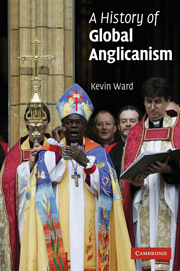Book contents
- Frontmatter
- Contents
- List of maps
- Preface
- List of abbreviations
- 1 Introduction: ‘not English, but Anglican’
- 2 The Atlantic isles and world Anglicanism
- 3 The United States
- 4 Canada
- 5 The Caribbean
- 6 Latin America
- 7 West Africa
- 8 Southern Africa
- 9 East Africa
- 10 The Middle East
- 11 South Asia
- 12 China
- 13 The Asian Pacific
- 14 Oceania
- 15 The Anglican communion: escaping the Anglo-Saxon captivity of the church?
- Maps
- Bibliography
- Index
2 - The Atlantic isles and world Anglicanism
Published online by Cambridge University Press: 04 May 2010
- Frontmatter
- Contents
- List of maps
- Preface
- List of abbreviations
- 1 Introduction: ‘not English, but Anglican’
- 2 The Atlantic isles and world Anglicanism
- 3 The United States
- 4 Canada
- 5 The Caribbean
- 6 Latin America
- 7 West Africa
- 8 Southern Africa
- 9 East Africa
- 10 The Middle East
- 11 South Asia
- 12 China
- 13 The Asian Pacific
- 14 Oceania
- 15 The Anglican communion: escaping the Anglo-Saxon captivity of the church?
- Maps
- Bibliography
- Index
Summary
The general burden of this book is that the diverse forms of Anglicanism which have developed in Asia and Africa, in Oceania and the Americas, are not simply clones of the English church. They have a dynamic and an integrity which derive from the special circumstances of their own history and geography and the engagement of the Gospel with the local cultures. But one important issue for all these churches, for some the dominant issue, is the historical legacy of British Christianity. This chapter will explore some of the major characteristics of the Anglican churches in Britain and Ireland since the Reformation and the effects of this history on the shape and self-understanding of the communion worldwide.
Since so much discussion of Anglicanism is Anglocentric, it is important to stress, at the outset, that the Church of England is neither the sole established church in Britain nor the sole representative of Anglicanism. The Church in Wales and the Church of Ireland are both Anglican, but they are no longer the ‘established’ churches of their respective lands. The Episcopal Church in Scotland is Anglican, but is not, nor (arguably) has it ever been, the established church in Scotland. That role is occupied by the (Presbyterian) Church of Scotland.
If there had been no Reformation, there would, doubtless, have been a distinctive English Catholicism which impacted worldwide. The Spanish and Portuguese Empires created their own special, idiosyncratic, forms of Roman Catholicism, closely allied to Iberian political power.
- Type
- Chapter
- Information
- A History of Global Anglicanism , pp. 19 - 45Publisher: Cambridge University PressPrint publication year: 2006



